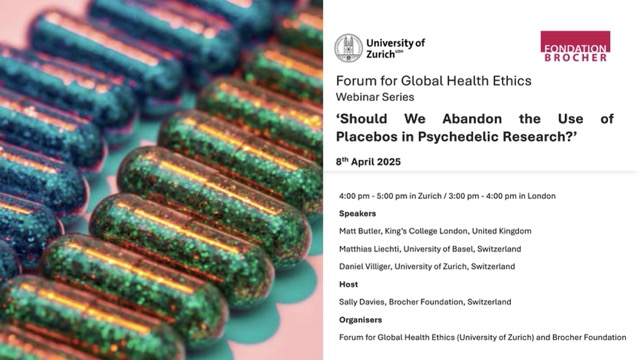Webinar on Placebos in Psychedelic Research

A warm thank you to the 140+ participants who joined us for this lively and thought-provoking webinar!
Together, we explored a spectrum of views on the use of placebos in psychedelic research – from those supporting their use, to others calling for their abandonment, as well as possible middle-ground approaches.
This discussion was grounded in the broader context of clinical research, where experts consistently emphasise that the most robust evidence for assessing therapeutic efficacy comes from randomised controlled trials (RCTs), with double-blind trials regarded as the gold standard. However, in psychedelic research, the subjective effects of psychedelics pose challenges to blinding, raising concerns about the interpretation of efficacy (Burke & Blumberger, 2021). In response, the U.S. Food and Drug Administration recommended trials with both placebo-controlled and non-placebo-controlled arms to address these issues (FDA, 2023).
There is an ongoing debate on what causes therapeutic effects in Psychedelic-Assisted Therapy. Some argue that the psychedelic substance itself is primarily responsible, while others suggest that the combination of the substance with the therapeutic context is key. Supporting the latter view, some scholars suggest that psychedelics function as “active super-placebos” – they serve mainly as catalysts and amplifiers of pre-existing beliefs, intentions, and motivations (Dupuis and Veissiere 2022). We addressed this debate, along with the broader use of placebos in psychedelic research, in greater depth during the webinar with experts in the field.
Speakers:
- Matt Butler, Institute of Psychiatry, Psychology & Neuroscience, King’s College London
- Matthias Liechti, Clinical Pharmacology Division, University Hospital Basel
- Daniel Villiger, Department of Philosophy, University of Zurich
Host: Sally Davies, Brocher Foundation
Webinar's concept: Tania Manríquez and Holger Baumann, University of Zurich
Organiser institutions: Forum for Global Health Ethics (IBME, University of Zurich) and Brocher Foundation
Here you can watch the clips of this webinar.
References:
- Burke, M. J., & Blumberger, D. M. (2021). Caution at psychiatry’s psychedelic frontier. Nature Medicine, 27(10), 1687–1688.
- Butler, M., Jelen, L., & Rucker, J. (2022). Expectancy in placebo-controlled trials of psychedelics: If so, so what? Psychopharmacology (Berl), 239(10), 3047-3055.
- Colagiuri, B. (2010). Participant expectancies in double-blind randomized placebo-controlled trials: Potential limitations to trial validity. Clinical Trials, 7(3), 246–255.
- Dupuis, D., & Veissière, S. (2022). Culture, context, and ethics in the therapeutic use of hallucinogens: Psychedelics as active super-placebos? Transcultural Psychiatry, 59(5), 571578.
- Muthukumaraswamy, S. D., Forsyth, A., & Lumley, T. (2021). Blinding and expectancy confounds in psychedelic randomized controlled trials. Expert Review of Clinical Pharmacology, 14(9), 1133–1152.
- U.S. Food and Drug Administration (FDA). (2023). Psychedelic drugs: Considerations for clinical investigations.
- Villiger, D. (2024). The double-blind randomized controlled trial as the gold standard in psychedelic research: Neither feasible nor desirable. Kennedy Institute of Ethics Journal.
If you have any questions or suggestions send us an email.
